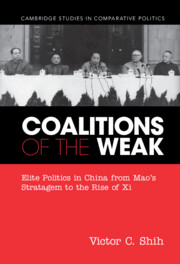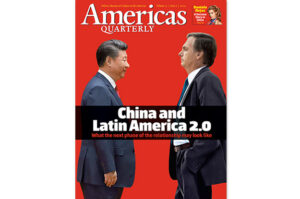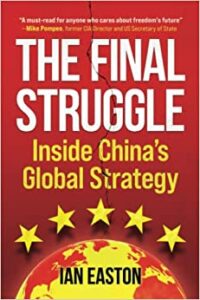 Speculation about political infighting and schisms at the top of the Chinese Communist Party are a common feature of its secretive system of appointing new leaders. But this year, political silly season has started early, and the swirl of rumor has been especially intense, according to The Washington Post’s Christian Shepherd and Eva Dou:
Speculation about political infighting and schisms at the top of the Chinese Communist Party are a common feature of its secretive system of appointing new leaders. But this year, political silly season has started early, and the swirl of rumor has been especially intense, according to The Washington Post’s Christian Shepherd and Eva Dou:
In a recent book, Victor Shih, a scholar of Chinese politics at the University of California at San Diego, argues that autocratic political systems such as China’s create an incentive for strongman leaders to adopt a strategy of building “coalitions of the weak,” where politically compromised or inexperienced officials are favored for positions of power as a way of guarding the top leader from challengers.
“What is unusual this time is that China as a whole is doing poorly ahead of a historic Party Congress,” said Minxin Pei, a political scientist at Claremont McKenna College [and a board member of the National Endowment for Democracy (NED)]. “Its economy is in terrible shape; the zero-covid policy looks increasingly untenable; and China’s relations with nearly all Western countries are at historic lows. This of course does not reflect well on Xi.”
China’s not on the agenda at President Joe Biden’s Summit of the Americas this week. But Beijing’s growing influence in Latin America and the Caribbean is fueling the administration’s drive to bolster U.S. engagement in its backyard, POLITICO’S Phelim Kine reports.
 Biden’s summit plan echoes his Indo-Pacific strategy: rewarding and bolstering nominally democratic allies while marginalizing Chinese-aligned autocratic states. But observers warn that the U.S. is playing catch-up to China as the region’s economic patron of choice.
Biden’s summit plan echoes his Indo-Pacific strategy: rewarding and bolstering nominally democratic allies while marginalizing Chinese-aligned autocratic states. But observers warn that the U.S. is playing catch-up to China as the region’s economic patron of choice.
“[China] is the elephant in the room — the U.S. is competing with China for influence in Latin America, but it has little to offer to put on the table,” said Jorge Heine, former Chilean ambassador to China and research professor at Boston University’s Pardee School of Global Studies. “China is today the main trading partner of South America as a whole and for most individual South American countries … so in terms of sheer market power, China is very strong.”
A proposal to ban China’s sharp-power Confucius Institutes from the UK has garnered cross-party support, including the chairman of the Commons foreign affairs committee Tom Tugendhat, POLITICO’s Eleni Courea reports:
Confucius Institutes are coming under scrutiny in several Western countries, including Germany. In 2021 the then-education minister Anja Karliczek warned that Beijing exercised “high-level influence” on public life after claims that the Chinese consul general in Dusseldorf forced two local institutes to cancel an online talk by two German journalists who had written a book about President Xi Jinping.
“We have seen the pressure that the Chinese Communist Party puts on those who speak out,” Tugendhat said. “We should not be reliant on an authoritarian state to teach its language in Britain.”
 Radio Taiwan discusses The Final Struggle: Inside China’s Global Strategy with the author Ian Easton, a senior director at the Project 2049 Institute. The book uses the regime’s own words to demonstrate “how Beijing’s aspirations aren’t regional—they’re global, with grave implications not only for democracy, but for the centuries-old principle of national sovereignty,” says analyst Matt Pottinger.
Radio Taiwan discusses The Final Struggle: Inside China’s Global Strategy with the author Ian Easton, a senior director at the Project 2049 Institute. The book uses the regime’s own words to demonstrate “how Beijing’s aspirations aren’t regional—they’re global, with grave implications not only for democracy, but for the centuries-old principle of national sovereignty,” says analyst Matt Pottinger.
China’s leaders ‘nervous’
Xi’s control of the formidable party discipline and ideology apparatuses mean any challenger faces a steep coordination problem to challenge his power, The Post’s Shepherd and Dou observe.
“Getting rid of him would be a very significant political earthquake for the party,” said Olivia Cheung, a research fellow at SOAS University of London. “No matter how many of the elite do not like Xi Jinping, there is a consensus that the party wants to stay on in power,” she tells The Post:
Mary Gallagher, a political scientist at the University of Michigan, said that Xi’s tenure has caused her to revise previous emphasis on China being unusual among authoritarian regimes, because before Xi, the party appeared to be moving toward institutionalization succession with top leaders bowing out after two terms.
“Having this expectation that every decade China’s leadership would change was really important in making China seem like a stable authoritarian regime,” she said. “Without those institutions in place, it not only makes investors nervous; it makes the next generation of leaders nervous.”
Another blow to #CCP #sharppower? China hawks seek to ban Confucius Institutes from Britain https://t.co/s7EWjOddRH
— Democracy Digest (@demdigest) June 9, 2022







